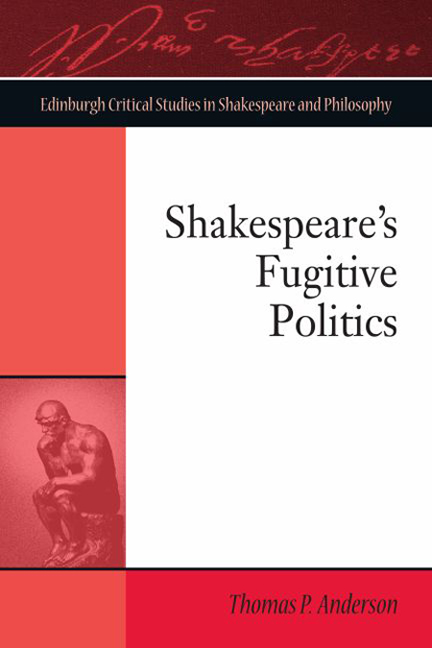Book contents
- Frontmatter
- Contents
- Acknowledgements
- Series Editor's Preface
- 1 The Embodied Will in Julius Caesar: An Introduction to Shakespeare's Fugitive Politics
- 2 Friendship, Sovereignty and Political Discord in Coriolanus
- 3 Touching Sovereignty in Henry V
- 4 Sovereignty's Scribbled Form in King John
- 5 Body Politics and the Non-Sovereign Exception in Titus Andronicus and The Winter's Tale
- Epilogue
- Notes
- Bibliography
- Index
1 - The Embodied Will in Julius Caesar: An Introduction to Shakespeare's Fugitive Politics
Published online by Cambridge University Press: 29 July 2017
- Frontmatter
- Contents
- Acknowledgements
- Series Editor's Preface
- 1 The Embodied Will in Julius Caesar: An Introduction to Shakespeare's Fugitive Politics
- 2 Friendship, Sovereignty and Political Discord in Coriolanus
- 3 Touching Sovereignty in Henry V
- 4 Sovereignty's Scribbled Form in King John
- 5 Body Politics and the Non-Sovereign Exception in Titus Andronicus and The Winter's Tale
- Epilogue
- Notes
- Bibliography
- Index
Summary
But let the world rank me in register A master-leaver and a fugitive.
Antony and Cleopatra, 4.10.20–1Who then but English Henry will be lord, And thou be thrust out like a fugitive?
1 Henry VI, 3.7.66–7‘fugitive’: Of immaterial things: Evanescent, fleeting, of short duration […] One who flees or tries to escape from danger, an enemy, justice, or an owner.
Oxford English DictionaryDespite the title's use of the word ‘fugitive’, which evokes a sense of dislocation, boundary and place, Shakespeare's Fugitive Politics is not about a particular location of politics in Shakespeare's plays. The word ‘fugitive’ might imply a place for politics in Shakespeare that his plays and their characters somehow escape, a boundary or proper scene for the political – and that Shakespeare's radicalism is his rejection of this proper place for a world elsewhere. In this understanding of the word ‘fugitive’ in the title, Shakespeare is a refugee from the properly political that defines and polices civil bounds. This book, however, is not necessarily interested in the proper place of politics in Shakespeare's plays – its policing and policed boundaries, its parameters and its institutions. Shakespeare's Fugitive Politics is, instead, about how the political is experienced in his plays. The book's central premise is that much of the political radicalism in Shakespeare is indifferent to politics – that is, indifferent to legitimised and public contestation that is ‘continuous, ceaseless, and endless’ in a civil society – and predicated instead on the possibility of dramatic subjects becoming political beings. In this formulation, as Sheldon Wolin has argued in the context of modern democracy, the political articulates not a form of civic engagement but a ‘mode of being’ that appears only temporarily. Wolin writes that ‘Democracy is a political moment, perhaps the political moment, when the political is remembered and recreated’. The democratic political persists as long as the memory of its past expression survives.
- Type
- Chapter
- Information
- Shakespeare's Fugitive Politics , pp. 1 - 28Publisher: Edinburgh University PressPrint publication year: 2016



